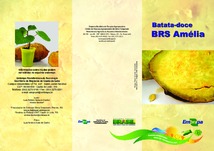Embrapa Mid-North
 Busca de Notícias
Busca de Notícias
BioFORT participates in international contest on successful cases in family farming
Photo: Paulo Lanzetta

The sweet potato BRS Amelia, which is biofortified with pro-vitamin A, is a runner-up as a successful case in an international competition.
The food biofortification research and technology transfer network coordinated by Embrapa, BioFORT, is participating in the "Third competition of successful cases of innovations for the adaptation of family agriculture - 'Agriculture and Nutrition'." The case comprised by the project is the biofortified sweet potato BRS Amelia - the variety is enriched with pro-vitamin A, which promotes food security, especially in communities in vulnerability conditions in Southern Brazil.
Organized by Fontagro, the contest aims at identifying and documenting successful examples of innovation in agriculture to improve food availability and nutritional quality. It also aims at identifying experiences that have potential to be reproduced elsewhere.
Learn more about the contest on their site.
Out of the three categories in the competition, BioFORT falls into the classification "National public sector and non-governmental organizations" of Latin America, the Caribbean and Spain, alongside 50 other experiences. In each category, the selected initiatives will receive funds for researchers, farmers and users who participated in the case; funds to strengthen the institucional capacity of the winner organization; and a trip to Washington to present the case.
In addition, the ten best selected cases will receive an award and will compose the final publication to be internationally distributed in Spanish and English to be presented in a special meeting at the Headquarters of the Inter-American Development Bank (IDB), in Washington, DC. The results should are due to come out by the end of this year.
The proposals submitted will be assessed through eight criteria: implementation in countries in Latin America, the Caribbean or Spain; realization in the last 15 years and implementation in at least three; direct benefit to smallholders; relationship with the agrifood chain; benefits in productive, economic, social, environmental aspects and in terms of nutritional diversification; potential for use in other regions; quantitative magnitude of the impact; and evidence of replicability.
For the leader of the BioFORT Network in Brazil, the Embrapa researcher José Luiz Viana de Carvalho, such participation goes beyond the dissemination of the project's history of success. "It is our contribution for the everyday lunch and supper with higher nutritional quality. That is, it is the sum of a series of practices so that we can reduce hidden hunger in Latin America", he stated.
Fontagro
Fontagro is a cooperation mechanism between countries of Latin America, the Caribbean and Spain, which promotes innovation in family farming, competitiveness and food security. It was created in 1998 with the aim of contributing to the sustainable management of natural resources, improved competitiveness and poverty reduction, through the development of technologies and innovations that are relevant for society and its member countries.
There are currently 15 member countries: Argentina, Bolivia, Chile, Colombia, Costa Rica, Equator, Spain, Honduras, Nicaragua, Panama, Paraguay, Peru, Dominican Republic, Uruguay and Venezuela. The Inter-American Development Bank (IDB) and the Inter-American Institute for Cooperation on Agriculture (IICA) sponsor the initiative.
BioFORT
The BioFORT Network is the set of projects responsible for food biofortification in Brazil. It aims at reducing malnutrition and ensuring greater food and nutritional security through increased iron, zinc and vitamin A content in the diets of more vulnerable populations - three of the world's largest defficiencies. In Brazil, biofortification consists in the selection and crossing of plants of the same species to generate more nutritional cultivars, with a focus on the breeding of staple foods, such as rice, beans, cowpeas, cassava, sweet potato, maize, squash and wheat.
Translation: Mariana Medeiros
Francisco Lima (13696 DRT/RS)
Embrapa Temperate Agriculture
Press inquiries
clima-temperado.imprensa@embrapa.br
Phone number: +55 53 3275.8206
Further information on the topic
Citizen Attention Service (SAC)
www.embrapa.br/contact-us/sac/

